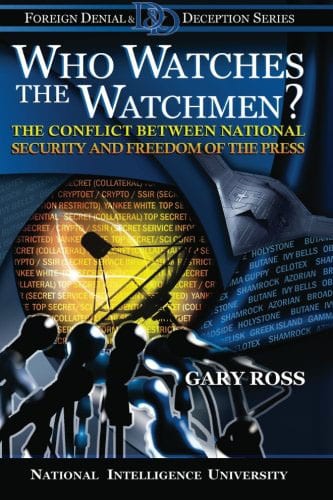GARY ROSS, M.S.
Assistant Professor of Managing Disruption and Violence (MDV)Gary Ross serves Daniel Morgan Graduate School as our Assistant Professor of Managing Disruption and Violence (MDV), providing students with both theoretical and applied instruction on persuasive communication principles to address the threat of disruptive or violent group behavior. His 25-year career in federal law enforcement has given him unique and practical insights which he conveys through his collaborative teaching methods.
Over the course of his distinguished career as a Special Agent, Ross conducted and supervised criminal, counterintelligence and counter-terrorism investigations and operations for the Department of Homeland Security (DHS), Office of the Director of National Intelligence (ODNI), and Naval Criminal Investigative Service (NCIS).
While at DHS, he also managed red team operations and vulnerability assessment to identify internal and external threats to DHS research and development facilities, national security programs, and critical infrastructure. He developed investigative policy in support of the establishment of an agency-wide Insider Threat Program in accordance with Executive Order 13587. During his tenure with ODNI, he provided oversight for the national unauthorized disclosure program and served as a subject matter expert for investigations within the Intelligence Community involving the disclosure of classified information.
Among his assignments as a Special Agent with NCIS, he served as the senior agency representative to a Joint Task Force responsible for disrupting the illegal acquisition of military technology and directed the completion of overseas threat assessments in conjunction with foreign military, intelligence and law enforcement agencies. He completed overseas assignments throughout Southeast Asia, Japan and the Middle East and is a recipient of the Department of Defense Team Award for National Security Investigations and the Director of Central Intelligence Team Award for Countering Foreign Denial and Deception.
Ross holds a Master of Science degree in Strategic Intelligence from National Intelligence University, and a Bachelor of Arts degree in Criminal Justice and Psychology from Michigan State University. He has completed advanced training at Carnegie Mellon University, American University, National Foreign Affairs Training Center, Joint Counterintelligence Training Academy, and Federal Law Enforcement Training Center.
RECENT
MEDIA

Who Watches the Watchmen? The Conflict between National Security and Freedom of the Press
In 2011, the Center for Strategic Intelligence Research published Who Watches the Watchmen? The Conflict between National Security and Freedom of the Press. The book examines the historical tension between the media and U.S. government and considers a strategy to reduce the perceived harm from the unauthorized disclosures of classified information. Gary has lectured at several Intelligence Community agencies, universities, and private organizations; including the American Bar Association and Associated Press. ‘Watchmen’ has been added to the syllabus for graduate courses at several universities; including Harvard University’s Kennedy School of Government, and Princeton’s Woodrow Wilson School of Public and International Affairs.
RECENT
MEDIA

Who Watches the Watchmen? The Conflict between National Security and Freedom of the Press
In 2011, the Center for Strategic Intelligence Research published Who Watches the Watchmen? The Conflict between National Security and Freedom of the Press. The book examines the historical tension between the media and U.S. government and considers a strategy to reduce the perceived harm from the unauthorized disclosures of classified information. Gary has lectured at several Intelligence Community agencies, universities, and private organizations; including the American Bar Association and Associated Press. ‘Watchmen’ has been added to the syllabus for graduate courses at several universities; including Harvard University’s Kennedy School of Government, and Princeton’s Woodrow Wilson School of Public and International Affairs.

U.S. backed in corner as Syria, Russia plan bloody assault in Idlib with chemical weapons in arsenal
Highlights of Past Media Releases and Appearances
Why Russia Will Prevail in Syria (The Washington Post) MAR 6, 2018
Iran Has Driven Israel and the Gulf Arab States Together (The Washington Post) JAN 4, 2018
The Pervasiveness of Anti-Semitism in Jordanian Media (Foreign Policy Research Institute) SEP 27, 2017
Russia and the U.S. have common interests in Syria. But it may not matter. (The Washington Post) JULY, 2017
A Humiliated Arab World Turns to Islamism (The Jewish Chronicle) JUN 6, 2017
Nasser’s Legacy on the 50th Anniversary of the 1967 War (The Huffington Post) MAY 23, 2017
Arab Decline and Iran’s Rising Influence (The Huffington Post) FEB 10, 2016
BOOK
Nasser’s Peace: Egypt’s Response to the 1967 War with Israel
Gamal Abdel Nasser was arguably one of the most influential Arab leaders in history. As President of Egypt from 1956 to 1970, he could have achieved a peace agreement with Israel, yet he preferred to maintain his unique leadership role by affirming pan-Arab nationalism and championing the liberation of Palestine, a common euphemism for the destruction of Israel.
In that era of Cold War politics, Nasser brilliantly played Moscow, Washington, and the United Nations to maximize his bargaining position and sustain his rule without compromising his core beliefs of Arab unity and solidarity. Surprisingly, little analysis is found regarding Nasser’s public and private perspectives on peace in the weeks and months immediately after the 1967 War. Nasser’s Peace is a close examination of how a developing country can rival world powers and how fluid the definition of “peace” can be.
Drawing on recently declassified primary sources, Michael Sharnoff thoroughly inspects Nasser’s post-war strategy, which he claims was a four-tiered diplomatic and media effort consisting of his public declarations, his private diplomatic consultations, the Egyptian media’s propaganda machine, and Egyptian diplomatic efforts. Sharnoff reveals that Nasser manipulated each tier masterfully, providing the answers they desired to hear, rather than stating the truth: that he wished to maintain control of his dictatorship and of his foothold in the Arab world.
ARTICLES AND BOOK CHAPTERS
The Pervasiveness of anti-Semitism in Jordanian Media (E-Notes, Foreign Policy Research Institute, September 2017)
A Humiliated Arab World Turns to Islamism (The Jewish Chronicle, June 6, 2017)
Nasser’s Legacy on the 50th Anniversary of the 1967 War (BESA Center Perspectives Paper No. 472, May 21, 2017)
Arab Decline and Iran’s Rising Influence (The World Post, 10 Feb 2016)
Egyptian President Gamal Abdel Nasser, leader of the largest Arab nation during the 1950s and 1960s, was one of the most popular and charismatic statesmen of the twentieth century. In his 1954 memoir, The Philosophy of the Revolution, Nasser claimed that Egypt’s unique geography and historical legacy enhanced its ability to influence Africa, the Muslim world, and the Arab world. Of these three significant regions, it was the Arab world which captivated Nasser’s attention the most: “I always imagine that in this region in which we live there is a role wandering aimlessly about in search of an actor to play it.” . . .
How the Egyptian Press Views the Yemen War (The World Post, 29 Apr 2015)
Michael Sharnoff explores recent editorials from major Egyptian newspapers that can provide a glimpse of Cairo’s attitudes toward the war in Yemen: On March 25, Saudi Arabia led a pan-Arab military campaign in Yemen known as “Decisive Storm” to expel the Iranian-backed Houthis, who seized control of the country in January after deposing President Abd Rabbuh Mansur Hadi. . . .
White House Needs to Support Egypt and Jordan With a Consistent Anti-Terrorism Strategy (The World Post, 10 Mar 2015)
Anticipate Greater Jordanian Role in the West Bank (Your Middle East, Jul. 4, 2013)
Palestinian Attitudes toward Israel (E-Notes: Middle East Media Monitor, Foreign Policy Research Institute, May 2012)
Reexamining the Arab Peace Initiative (Huffington Post, Jan. 24, 2012)
Post-Mubarak Egyptian Attitudes toward Israel (E-Notes: Middle East Media Monitor, Foreign Policy Research Institute, Oct. 2011)
Revisiting Nasser and Palestine after the 1967 War (al Arabiya, Jun. 2011)
JOURNALS
“Inconsistent Policies for the Arab Uprising,” inFOCUS Quarterly, Fall 2012.
“Israel’s Relationship with Egypt: An Uncertain Future,” Near East Quarterly, Issue IX (August 2012).
“Can Palestinian Third Parties Make A Difference?” Palestine-Israel Journal (Vol. 18 No. 2 & 3, 2012).
“Defining the Enemy as Israel, Zionist, Neo-Nazi or Jewish: The Propaganda War under Nasser’s Egypt, 1952-1967,”Vidal Sassoon Center International Center for the Study of Antisemitism, Feb. 2012.
“Nasser’s Arab Rivals: 1958-1967,” Institute for Security and Defense Analysis (Greece), Middle East Observer (Issue 4, Vol. 4, March-June 2011).
“The Syrian-Soviet Alliance,” inFOCUS Quarterly, Spring 2009.
BOOK REVIEW
A Peace to End All Peace. Juliana Geran Pilon, inFOCUS Quarterly, Spring 2017.
Unprotected: Palestinians in Egypt since 1948. Association for the Study of the Middle East and Africa, May 18, 2010.
website
Sharnoff’s Global Views features unique and original commentary straight from the people who live it. Launched in 2012, Sharnoff’s Global Views is an independent website and exists solely for its contributors and readers.


